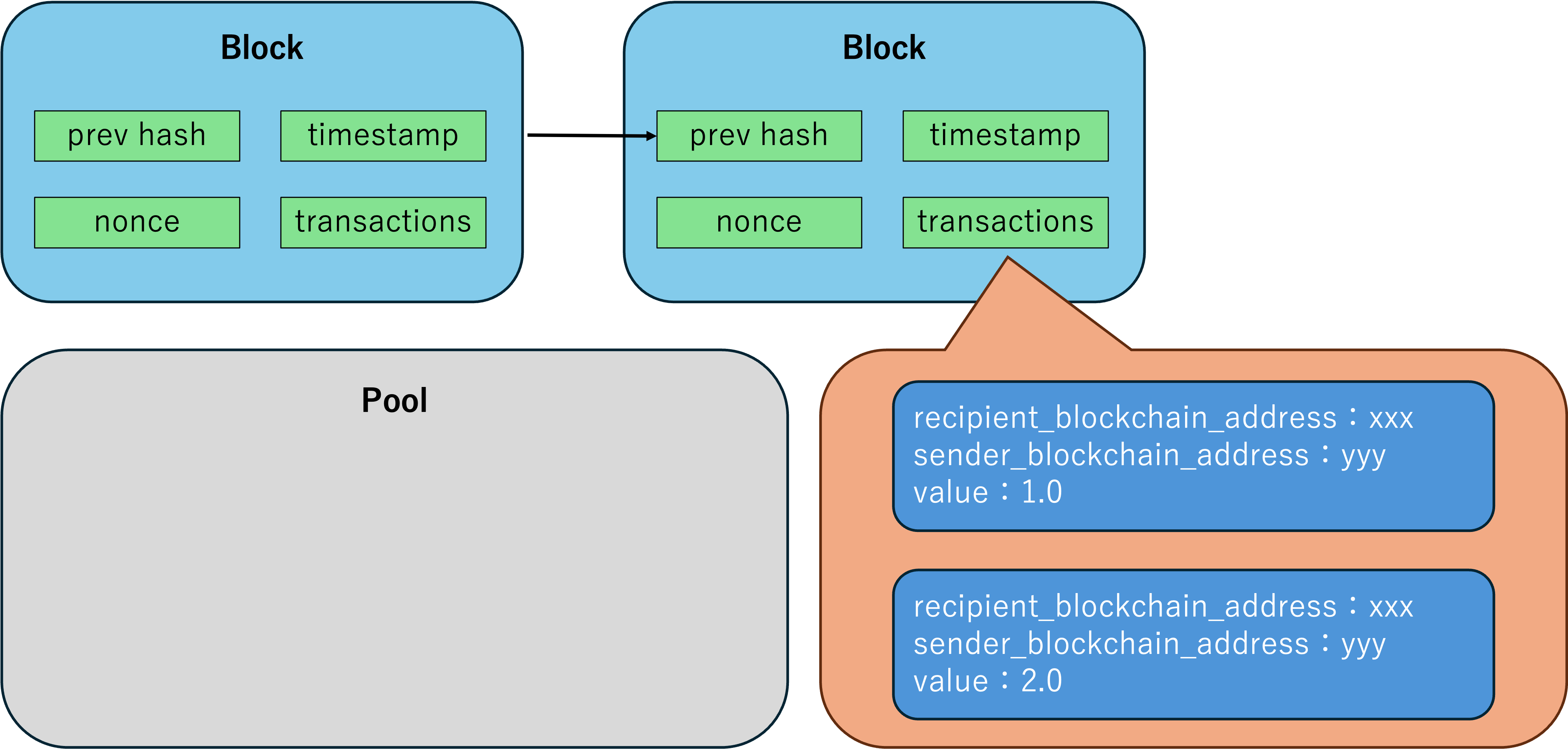はじめに
前回は、Block、Blockchainの作成、hashの実装までやりましたが、今回はtransactionsの実装をしていきます。
- 前回までの記事
- バージョン
- Go 1.22.0
実装
イメージ図
下の図のPool、transactionsの実装をしていきます。

transactionsの実装
まず、transactionsの実装をしていきます。
type Transaction struct {
senderBlockchainAddress string
recipientBlockchainAddress string
value float32
}
func NewTransaction(sender string, recipient string, value float32) *Transaction {
return &Transaction{sender, recipient, value}
}
func (t *Transaction) MarshalJSON() ([]byte, error) {
return json.Marshal(struct {
SenderBlockchainAddress string `json:"sender_blockchain_address"`
RecipientBlockchainAddress string `json:"recipient_blockchain_address"`
Value float32 `json:"value"`
}{
SenderBlockchainAddress: t.senderBlockchainAddress,
RecipientBlockchainAddress: t.recipientBlockchainAddress,
Value: t.value,
})
}
Transactionは、senderBlockchainAddress、recipientBlockchainAddress、valueでstructを定義します。
NewTransactionでは、sender、recipient、valueの値を受け取り、Transactionを作成しています。
MarshalJSONは、前回もありましたが、json.Marshalをするために実装しています。
また、Transactionを定義したので、前回作成したコードでTransactionを使用している部分の修正をしていきます。
type Block struct {
// stringから*Transactionに変更
// transactions []string
transactions []*Transaction
}
// 引数にtransactionsを追加
// func NewBlock(nonce int, previousHash [32]byte) *Block {
func NewBlock(nonce int, previousHash [32]byte, transactions []*Transaction) *Block {
b := new(Block)
b.timestamp = time.Now().UnixNano()
b.nonce = nonce
b.previousHash = previousHash
b.transactions = transactions // 追加
return b
}
func (b *Block) MarshalJSON() ([]byte, error) {
// stringから*Transactionに変更
// Transactions []string `json:"transactions"`
Transactions []*Transaction `json:"transactions"`
type Blockchain struct {
// stringから*Transactionに変更
// transactionPool []string
transactionPool []*Transaction
chain []*Block
}
func (bc *Blockchain) CreateBlock(nonce int, previousHash [32]byte) *Block {
// bc.transactionPoolを引数に追加
// b := NewBlock(nonce, previousHash)
b := NewBlock(nonce, previousHash, bc.transactionPool)
bc.chain = append(bc.chain, b)
bc.transactionPool = []*Transaction{} // 追加
return b
}
次に、TransactionをBlockchainのstructに追加するコードを実装します。
func (bc *Blockchain) AddTransaction(sender string, recipient string, value float32) {
t := NewTransaction(sender, recipient, value)
bc.transactionPool = append(bc.transactionPool, t)
}
AddTransactionでは、sender、recipient、valueの値を受け取り、Transactionを作成して、BlockchainのtransactionPoolに追加しています。
おわりに
今回は、transactionsの実装をしていきました。
次回は、nonceの実装をしていきます。
次の記事
参考